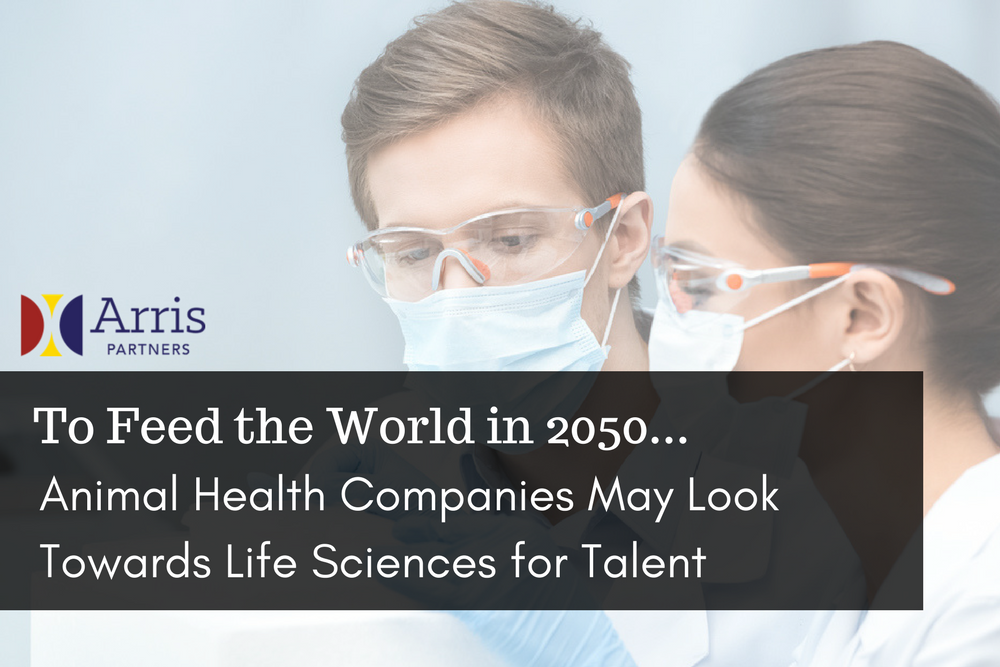By 2050, the world will need to find a way to feed two billion more people without overwhelming the planet. While we often picture cars, coal mines and factories when we think of threats to our planet, food poses a potentially even larger challenge. Globalization and an expected growth in global affluence means that a substantial increase in per capita meat, dairy and fish consumption is likely. Demand for calories from animal products will nearly double, according to a research paper published by the National Academies Press. To meet future food demands, significant investment in Animal Science, policy changes and resources that support agricultural production will be required.
To achieve the necessary level of innovation going forward, it is expected that animal health companies will need to significantly invest in hiring top scientists from around the world from a wide range of backgrounds. In some cases, these companies may have to think outside the box when luring talent and look towards life sciences professionals who have traditionally worked on products intended for human use.
Below, we look into how life sciences professionals can smoothly translate their skill set to animal health, where they will be seen as experts and can take advantage of an abundance of leadership and career advancement opportunities.
The Role of Animal Science in Future Food Security and Stability
Maintaining an adequate level of animal production for future generations will require rethinking about the overall nature of Animal Science, including productivity efficiency, breeding and genetic technologies, nutritional requirements, feed technology and animal welfare. Additionally, the potential socioeconomic impacts must be taken into account.
With the reduction in number of academic animal breeding programs, particularly in North America, the industry is experiencing a deficit in human talent and resources ready to take on these challenges. For example, quantitative geneticists are lacking and the few are being produced in the remaining academic programs are typically entering plant and biomedical spaces.
U.S. agricultural, animal health, and food companies are struggling to attract enough workers, a challenge that the industry agrees is getting worse as innovation and growing demand have led to the creation of thousands of jobs. This presents an opportunity for both animal health organizations and life sciences professionals, particularly those who are working in a highly regulated and saturated environment.
Opportunities for Life Sciences Professionals In Animal Health
Life Sciences professionals can seamlessly transfer their skill set to the animal health industry and work on almost exactly the same products. By making the jump to animal health, these professionals can effectively catapult their careers, gain autonomy and, in some cases, immediately step into roles where they are seen as leaders. The difference is simply that the end user is an animal rather than a human. If you currently work in the Life Sciences industry, it’s important that you know that your skills are highly marketable within animal health and that there may be great opportunity to make an impact through your work.
While Life Sciences has always been an industry focused on cutting edge technology and products, animal health is quickly catching up. In fact, according to the Life Science leader, “the animal health industry is on a growth trajectory, and the many large and small companies that develop and manufacture drugs and vaccines for pets and livestock animals are expected to generate $33 billion in sales by 2020, after a record $24 billion in 2014.”
Translate Your Ideas into a Product Quicker in animal health
According to PwC, the most critical difference between Big Pharma and animal health companies is how quickly animal health professionals can translate an idea into a product. Unlike biopharmaceutical drugs for humans, experimental veterinary medicines can be evaluated in the intended species immediately. This means that early in the R&D process, animal health professionals can know a compound’s safety and effectiveness. They can also make observations over a long period of a patient’s life cycle, which allows them to make more reliable, relevant and predictive results about a new drug.
Moreover, along with their Big Pharma competitors, animal health companies are taking advantage of new technologies, such as new delivery methods, genomics technology, digital technologies and visual imagining, to improve the development and application of their products.
Partner With Arris Partners to Recruit Animal Health and Life Sciences Talent
If you’re frustrated with regulatory red tape or are looking for an exciting way to advance your career as a scientist, organic chemist or research professional, Arris Partners can help guide you into an exciting new role in animal health. However, we also specialize in placing talent at top life sciences companies as well.
If you run or manage hiring for an animal health company, consider the potential of tapping into our network of life sciences and animal health professionals to recruit the talent you need to continue to innovate. You need a company that understands the complex nuances of the industry. Our recruiters have been placing top animal health and life sciences professionals at leading organizations ranging from emerging startup to Fortune 500 for 20 years. If you’re looking for transformative animal health or life sciences talent with the power to drive change and lead, contact us today.

